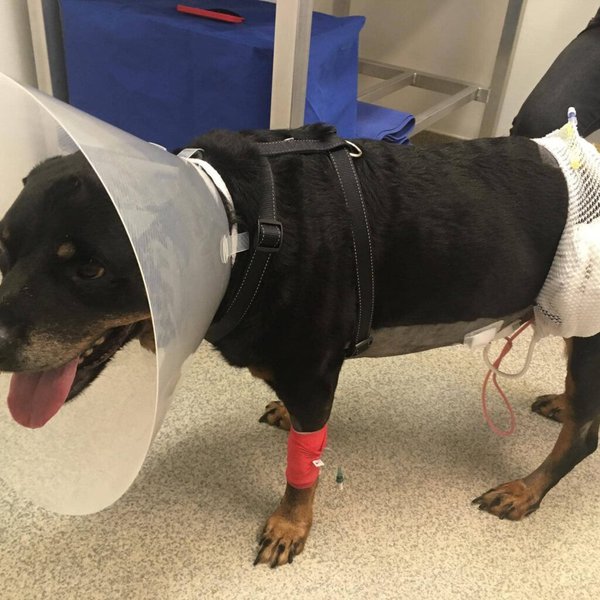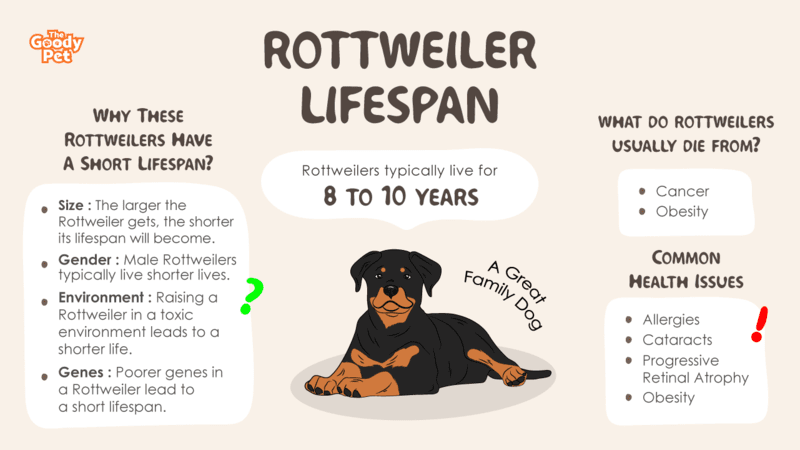The good-natured and gentle Rottweiler pooch is, for the most part, a healthy and disease-free dog breed. But like all other dogs, poor living conditions will lead this pooch to succumb to certain health conditions.
Going forward, what is considered to be the average Rottweiler lifespan and what medical conditions are this pooch prone to during its lifespan? Rottweilers typically have a life expectancy of between 8 to 10 years, with an average lifespan of 9 years. And the Rottweiler is prone to a number of health issues during its lifespan, with the most common occurrences including aortic stenosis, hip dysplasia, and canine allergies.
Proper care and maintenance are needed to ensure that the Rottweiler’s short lifespan will be a disease-free one, and we’ll be discussing the rudiments of caring for this pooch in this article. However, before we go further, let’s dissect the factors responsible for Rottweiler’s relatively short lifespan.
Why Do Rottweilers Have A Short Lifespan?
Rottweilers typically have a sweet and friendly personality, and can make for great family dogs. But unfortunately, this dog’s life expectancy is considerably short, and this is due to the fact that the Rottweiler is prone to suffering from several medical disorders and health issues.
The average lifespan of a Rottweiler typically falls between 8 to 10 years. Of course, this range is an estimation based on information gathered from dog owners and medical records, and it is well possible for a Rottie to live longer than 10 years.
Regardless of these outliers, the Rottweiler remains a breed with a relatively short lifespan, compared to the longest-living dog breeds, and this can be attributed to the factors explained below:
Size
The Rottweiler is a large dog – adult weights for this pooch typically range from 95 to 135 lbs for males and 80 to 100 lbs for females! – and this can be more of a curse than a blessing.
Several studies, including the 2013 research journal by The American Naturalist, aimed at establishing a link between a pooch’s weight and its life expectancy have come to the conclusion that large dog breeds tend to have a shorter lifespan, compared to the smaller dogs.
The Rottweiler, being on the larger end of the do weight chart, isn’t favored well by these reported findings. Its large size is also responsible for the development of several health issues, which can significantly reduce the quality of the pooch’s life, and by extension, its lifespan.
Gender
Generally, you can also expect a female Rottweiler to live longer than a male Rottweiler. And this isn’t unrelated to the fact that male Rottweilers typically grow larger than their female counterparts.
Environment
The environment a Rottweiler is raised in also plays a significant role in determining how long the pooch will be around for. That said, a Rottweiler that is raised in a toxic environment and that isn’t properly cared for will live a relatively shorter life compared to a Rottie raised in a healthy environment, and whose health and maintenance needs are promptly attended to.
Genes
Another factor that contributes significantly to a Rottweiler’s lifespan is the pooch’s genes.
Selective breeding and health testing helps ensure that good genes are passed across from Rottweiler parents to their puppies, and this can considerably extend the pooch’s life.
Similarly, Rottweilers that inherit bad genes from their parents typically also inherit a host of health problems, and this can be detrimental to the pooch’s health in the long-run.

What Do Rottweilers Usually Die From?
As stated earlier, the Rottweiler is predisposed to several health issues, and as expected, some of these are usually more fatal than others.
That said, the leading causes of Rottweiler deaths worldwide include:
Cancer
With a fatality rate that stands at approximately 33% of all Rottweiler deaths per year, cancer is the leading cause of death in this dog breed. And the most prevalent case of cancer in Rottweilers is bone cancer.
Sadly, there’s nothing much that can be done if a Rottweiler is diagnosed with bone cancer, which is why the fatality rate is quite high. And there isn’t much that can be done to prevent a Rottie from contracting this disease either.
However, with frequent medical check-ups, cancer in Rottweilers can be detected at an early stage, and measures to better manage the condition can be subsequently put in place.
Obesity
A Rottweiler will grow to be grossly overweight if it is fed without restraint, and this can be quite detrimental to the pooch’s health and wellbeing.
Obesity is quite dangerous for Rottweilers because it tends to lead to the development of several other health issues such as arthritis, heart problems and breathing difficulties. And several studies have linked approximately 7.1% of all Rottweiler deaths in a year to this mass-associated disease.
Gastrointestinal and brain disorders are also responsible for a considerable amount of Rottweiler deaths on a yearly basis, but they are typically less prevalent than cancer and obesity-related deaths.
Common Health Issues
The Rottweiler is obviously large-sized; hence this pooch tends to struggle with weight-related issues, especially if it isn’t properly maintained.
Chief among the weight-related issues that a Rottweiler is predisposed to be hip dysplasia, a medical condition that is characterized by a recurring displacement of the pooch’s hip joint and thigh bone.
Rottweilers are also known to suffer breathing difficulties, no thanks to their considerably short snouts. And the list of medical conditions that this pooch is predisposed to also includes:
- Allergies
- Cataracts
- Progressive Retinal Atrophy, and
- Aortic stenosis, among others

Learn To Read The Danger Signs – How Do I Know If My Rottweiler Is Dying?
Death is an inevitable part of life, and your Rottweiler, like all other dogs, will draw its last breath one day. Consequently, knowledge of the signs that your Rottweiler is nearing the end of its life is necessary to make preparations that ensure your pooch’s last days are as comfortable as possible.
That said, some of the signs and symptoms that are commonly exhibited by a dying Rottweiler include:
Loss Of Bladder And Bowel Control
The muscles located in a Rottweiler’s bladder and bowel region will typically loosen as the pooch ages. And when the Rottweiler is close to the end of its life, it completely loses control over its bladder and bowel, thereby leading to more bathroom accidents.
How Can You Help?
- Employ the use of special doggie pads to prevent bathroom accidents.
Loss Of Appetite And Weight
In addition to losing control over its bowel and bladder, a dying Rottweiler tends to eat less than its usual meal portion, and in some cases, the pooch may even stop eating altogether.
Consequently, a dying Rottweiler that has refused to take in food will experience either gradual or rapid weight loss and muscle wasting.
How Can You Help?
- Provide smaller meals at frequent intervals.
- Consult your vet to prescribe appetite boosters.
Loss Of Interest In Daily Activities
A dying Rottweiler typically loses interest in activities going on in its surroundings, and will instead seek solace in isolated and quiet places around the home.
This loss of interest can either be because the Rottweiler is feeling more tired than usual or simply because moving around is too painful for the pooch.
How Can You Help?
- Place lush blankets in the pooch’s favorite resting positions to provide comfort.
- Respect your Rott’s desire for privacy, and speak calmly to the pooch if you have to interact with it.
Breathing Difficulties
A dying Rottweiler may find it difficult to breathe, and you can typically observe such a pooch panting or gasping for air.
How Can You Help?
- Schedule an appointment with your vet immediately after you notice your Rottie finding it difficult to breathe.
Reduced Body Temperature
A dying Rottweiler’s body temperature typically drops below normal, and the pooch’s body is considerably cooler to the touch.
How Can You Help?
- Keep the pooch warm by providing light blankets or slightly heating up the home.
Apart from those explained above, other signs commonly exhibited by a dying Rottweiler include:
- Restlessness
- Changes in gum color
- Extreme lethargy
- Gastrointestinal disorders
NOTE: There are several medical conditions that may cause a Rottweiler to display the symptoms listed above. Hence, when you notice your Rottweiler acting funny, don’t just conclude that your furry friend is dying, but you should consult your vet to see if the pooch is suffering from a treatable medical condition.

How To Take Better Care Of Your Rottweiler?
Dietary Needs
Generally, adult Rottweilers thrive best on meals that contain between 22% to 26% of animal-based protein, such as chicken, turkey, or lamb.
The required percentage of animal-based protein for puppy Rottweilers is significantly higher, and these young pups typically require between 24% to 28% of meat for healthy growth and development.
The best food product for your Rottweiler is one that lists animal-based protein as its first and major source of nutrition. Healthy fats and carbohydrates should also be included in your Rottweiler’s diet, but this should be in small amounts – feeding a Rottweiler a meal with a high-fat percentage will lead to weight issues for the pooch!
If you’re considering a wet diet for your Rottweiler, a really good brand that we recommend you take a look at is Pet Plate. The Pet Plate diet is formulated from simple and natural ingredients, and you can also get a customized meal for your pooch to deal with weight issues.
Rottweilers also have no issues with being fed dry kibble, and you can as well prepare a homemade diet for this pooch. And if you’ll be feeding your Rottweiler a homemade meal, supplementing its food with the Multivitamin Treats Supplement – Zesty Paws Probiotics will make up for nutrients that may have been unintentionally left out.
What Can Rottweilers Not Eat?
Regardless of whatever you end up feeding your Rottweiler, you should ensure that the pooch’s food is devoid of chemical preservatives, artificial coloring, or sugar. And the reason for this is simple – not only do they add zero nutritional value to the pooch’s meals, but these additives can also be toxic to the pooch when consumed over time.
Similarly, fillers and grains such as corn, wheat, and soy have been shown to trigger food allergies in Rottweilers, and these should be avoided at all costs. You should also avoid feeding your Rottweiler with chocolate, grapes, raisins, onions, and garlic, as these foods can be extremely toxic to the pooch.
Exercise Requirements
Rottweilers are quite active, and they need a considerable amount of exercise and training to keep them physically fit and happy.
It is recommended that an adult Rottweiler be exercised for, at least, two hours per day. And this should involve going on long walks or simply leaving the Rottweiler to run off-leash, in a safe, confined environment. Also, to maintain your Rottweiler’s physical conditioning, it is recommended that the two hours of exercise should be split into two sessions per day.
Mental development is equally as important as physical fitness for a Rottweiler; Hence, exercises and games that mentally stimulate a pooch, such as treat scavenger hunts and interactive puzzles should be a part of the Rottweiler’s daily routine.
Related Questions
What Is The Longest A Rottweiler Has Lived? There is a scant amount of record available on the longest a Rottweiler has lived. But several reports and social media comments suggest that Bort, a 15-year-old Rottweiler that resides in Massachusetts, is currently one of, if not the longest-living Rottweilers ever.
What Age Is A Rottweiler A Senior? Rottweilers are typically considered to be senior dogs once they attain between 7.5 to 9 years of age. And it is usually within this age range that Rottweilers begin to slow down and display signs associated with aging, such as a loss of appetite, development of dental issues, and personality changes, just to mention a few.
How Long Do Rottweiler Mixes Live? Rottweiler Mixes typically tend to live longer than their purebred counterparts. And the lifespan of these mixed pooches can be as low as 6 years, and in some cases, as high as 17 years. The higher life expectancy of Rottweiler mixes can be attributed to the fact that these pooches are specially bred to eliminate health problems commonly found in purebred Rotts.





